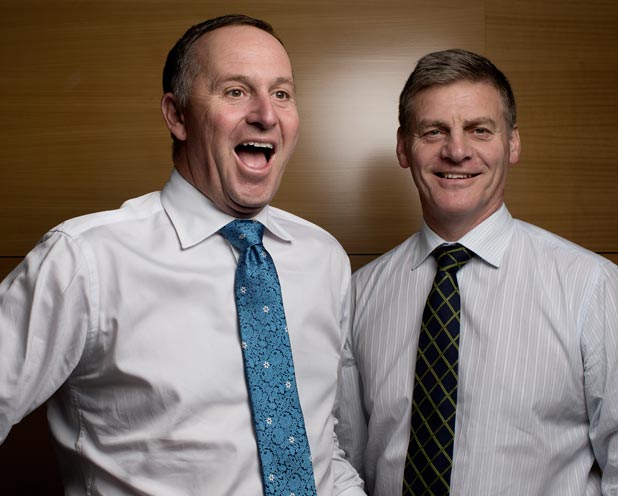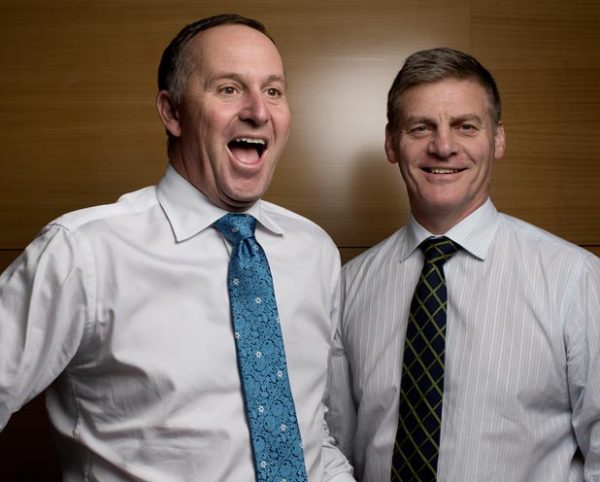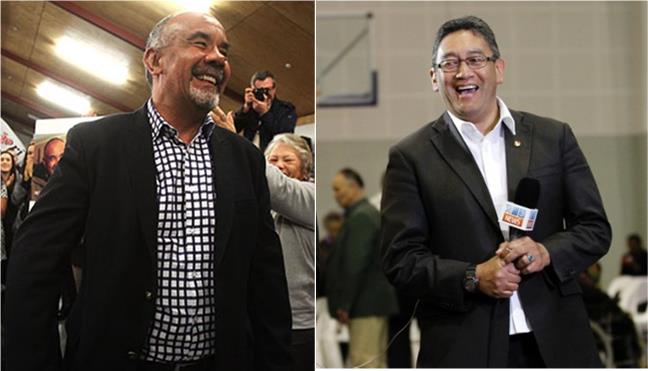
A religious fanatic, a crypto-fascist and a Dalek – these are our choices for Prime Minister of NZ?

You don’t appreciate the hole that Key has left in the National until you look at the cast of mutants who are now vying for his job. National without John Key is like a night out in Hamilton without alcohol or condoms – dull and terribly risky.
The cavalcade of political circus freaks vying for the top job speaks to the haste and secrecy of Key’s resignation. If English believed in September that Key was serious about stepping aside, he would have at least been certain of whether he was running, the shock of the resignation was a far larger surprise to National than Key’s cover story allows for.
While we still attempt to investigate the why of that resignation, let’s look at the beauty competition judged by lepers that the National Party leadership race is descending into.
Bill English – the religious welfare hating fanatic
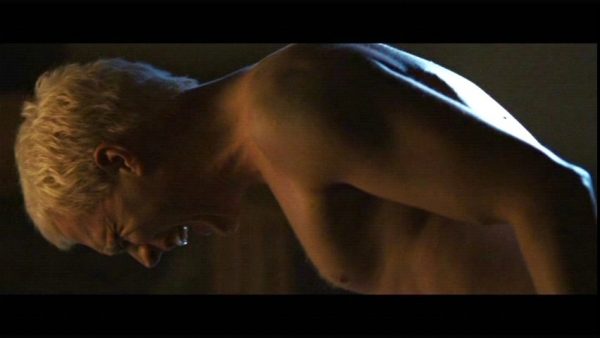
What many always miss about English is that he is a fanatical Catholic. I wouldn’t be surprised if he whips himself to sleep nightly. English desperately needed Key because English has all the charm and personal warmth of a road accident. Key was the smiling vacant face while English spent time privatising state housing, expanding the neoliberal welfare state and pushing for mass surveillance of beneficiaries. For English, the greatest sin is state welfare which allows the poor to gravitate towards secular institutions as providers instead of fearing the lamb of Christ. His dull and tepid public statements are designed to calm markets, it isn’t to inspire voters. Those within the Party who just want to make it to the election without too much internal blood letting will back English.
The only reason English is running is to stop Judith from being the Leader. English is Bennett’s mentor, so if English wins, expect him to hold the reigns and then retire to give it to Bennett.
Jonathan Coleman – The Dalek
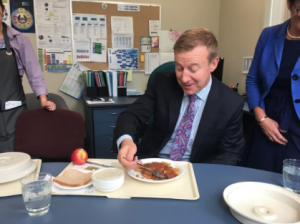
The Minister of Wheeze, Dr Croak has a voice honied by years of cigarettes and stepping on poor peoples dreams. Possibly the most hopeless Minister ever, he did a shit job with Broadcasting and he’s a joke in Health. He wouldn’t publicly eat the cheap slop he was forcing hospital patients to eat and had the audacity to privately eat it and tweet about how yummy it was. The entire fiasco was so carefully managed so that Coleman wouldn’t gag while eating it publicly.
He sounds like a dalek and has all the personality of a dalek. The least deserving individual in Cabinet, his running is to make it look like a competition of ideas when it really isn’t.
Judith Collins – the crypto-fascist
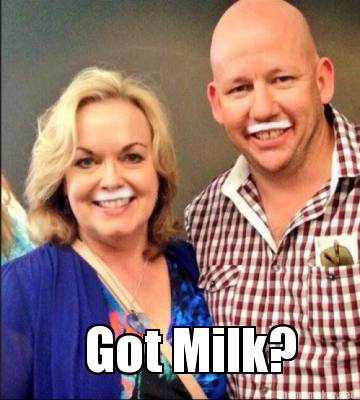
The majority within National fear Judith Collins because they believe she would use the power of the Office in terrible ways that would actually make NZ more Police state than functioning democracy. She has huge support in the backbenches and wants to implement the slater-lusk plan to enrage white voters to do a Trump here in NZ.
Dumped in 2014 for her role in helping Cameron Slater attempt to take out the Serious Fraud Office, her winning would empower Slater back into being her main attack dog.
Do we really want this back in Politics?
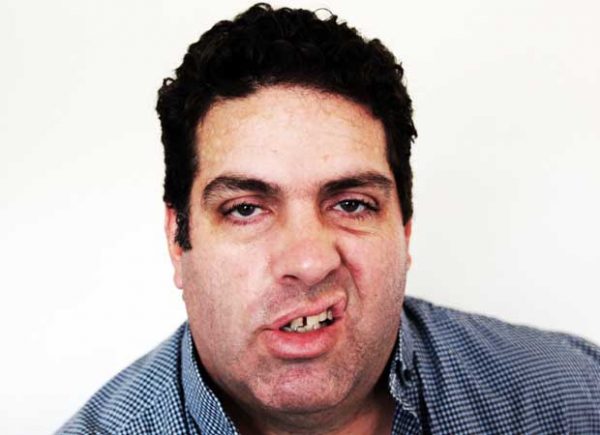
Watch who Maggie Barry and Simon Bridges back to glean where this will end. If English wins, expect Collins to run a guerrilla civil war against him for the next 10 months.
The only certainty is now the Key brand has stepped aside, NZers get to see the viciousness of the National factions in all their glory.
The Dismantling of a Prime Minister – Completed
.
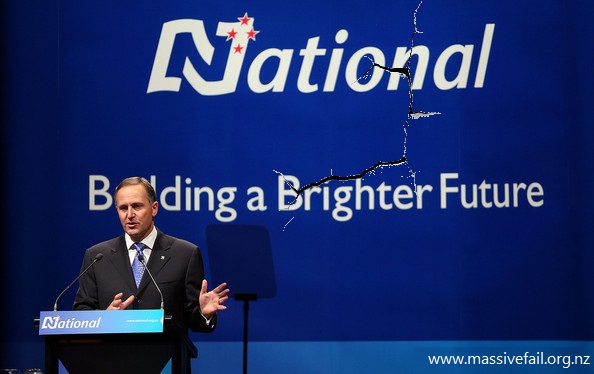
.
As with the death of Princess Diana; Trump winning the Presidency, or (if you’re old enough) the assassination of JFK, you will recall where you were when you heard this sudden, unexpected and gob-smacking public announcement from John Key;
.
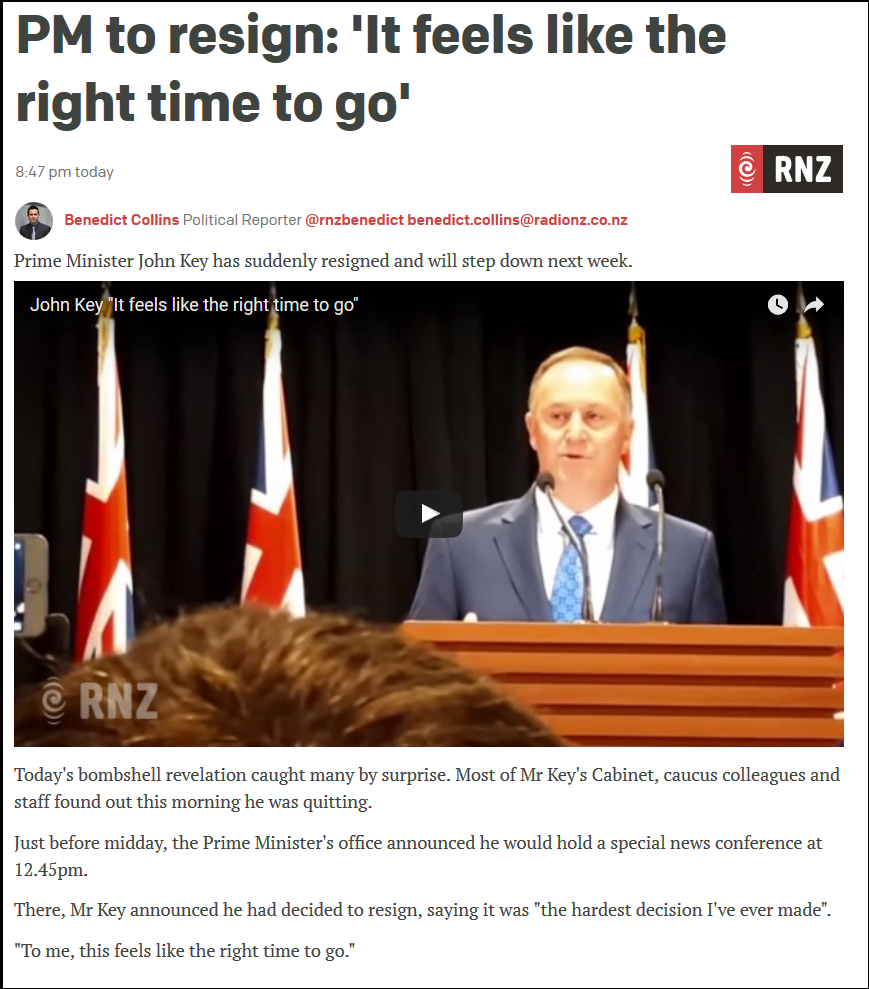
.
At 12.50pm, Radio NZ interrupted it’s international-segment – Worldwatch – to announce John Key’s resignation and crossed live to his press conference. Ironically, the Worldwatch segment featured an interview about the resignation of Italy’s own Prime Minister, Matteo Renzi.
Like 4.4 million other New Zealanders, this blogger was taken by surprise. (At first, I thought Radio NZ was reporting on Bill English stepping down.)
There are two aspects to Key’s resignation which have taken my attention.
Key’s “Popularity”
Media personalities, pundits, and political opponants have all praised Key’s popularity.
In the NZ Herald, Audrey Young gushed;
“He is still immensely popular after eight years.
[…]
They will abound because what Key has done defies political gravity.”
Writing for Fairfax media, Tracy Watkins said;
“Nothing can be the same when a leader as popular, and as successful, as Key bows out.”
John Campbell on Radio NZ’s Checkpoint enthused;
“…And after eight years [Key] still sits at honeymoon levels of popularity in opinion polls.”
To Key he remarked;
“Your popularity has defied the laws of gravity.”
None of which is true.
The media and political pundits have been reading glowing “obituaries” for a man still very much alive and drawing breath.
In fact, Key’s popularity has been spiralling downward since a high of 55.8% in October 2009;
Oct/Nov 08: 36.4%
(Source)
Feb 2009: 52.1%
April 2009: 51.1%
Aug 2009: 51.6%
Oct 2009: 55.8%
Feb 2010: 49.4%
April 2010: 49.0%
June 2010: 49.6%
Jul/Aug 2010: 48.7%
Sept/Oct 2010: 50.6%
Nov/Dec 2010: 54.1%
Feb 2011: 49.1%
April 2011: 52.4%
May 2011: 48.2%
Jun/Jul 2011: 50.5%
Aug 2011: 53.3%
Sept 2011: 54.5%
Oct 2011: 52.7%
1-8 Nov 2011: 50.0%
9-16 Nov 2011: 49.4%
16-23 Nov 2011: 48.9%
Feb 2012: 45.8%
April 2012: 44.2%
May/Jun 2012: 40.5%
July: 43.2%
(Source)
Feb 2013: 41.0%
April 2013: 38.0%
May 2013: 41.0%
Jul 2013: 42.0%
Nov 2013: 40.9%
Jan 2014: 38.9%
Mar 2014: 42.6%
May 2014: 43.1%
Jun 2014: 46.7%
Jul 2014: 43.8%
5-3 Aug 2014: 44.1%
19-25 Aug 2014: 41.4%
26 Aug-1 Sept 2014: 45.1%
2-8 Sept 2014: 45.3%
9-15 Sept 2014: 44.1%
Jan 2015: 44.0%
May 2015: 39.4%
(Source)
15-22 July 2015: 38.3%
(Source)
8-16 Sept 2015: 39.5%
(Source)
22 Nov 2015: 38.3%
(source)
24 May 2016: 36.7%
(source)
Only four months ago, Key’s Preferred Prime Minister rating had levelled;
8 Aug 2016: 36.7% (n/c)
(source)
By contrast, National’s most recent Party-poll ratings remained astronomically (and somewhat unfeasibly) high;
Roy Morgan: 49.5%
Colmar Brunton: 50%
Reid Research: 45.1%
As a party, National has been consistently out-polling it’s own supposedly “popular” Prime Minister. If Key’s personal polling had continued to drop further, it is conceivable that he would have become a Muldoonesque liability instead of the gilt-edged asset he has been for the last three elections.
Which would go some way to explaining why Key’s photo-ops with National Party candidate, Parmjeet Parmar, during the Mt Roskill by-election seems to have had zero positive effect on her election result;
.
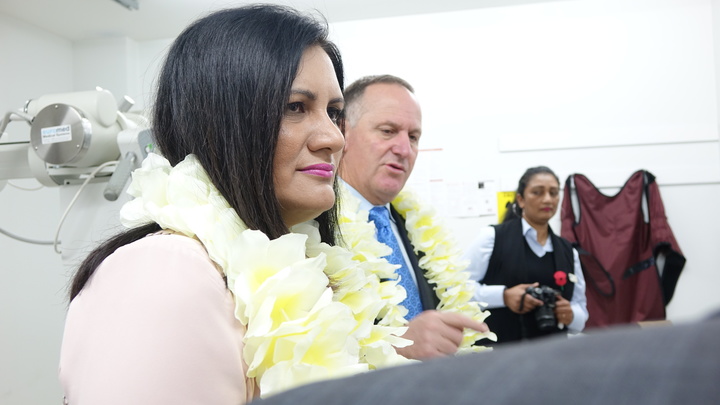
.
When asked if he would attend Ms Parmar’s by-election campaign party, Key replied;
“I don’t go to any of the by-election ones. I haven’t historically and I won’t be going whether we win lose or draw.”
To which Jenna Lynch, writing for TV3 News, pointed out;
“That’s only partly true though – he didn’t attend the party of Mark Osborne in Northland – he lost. He also didn’t go to Melissa Lee’s failed campaign for the Mt Albert by-election.
But he did attend parties where it seemed he thought his candidate had a chance.”
“Reading the entrails”, Key understood that his days of surging popularity were drawing to an end. The media and pundits were simply slow to catch up with Key’s own realisation of his inevitable fate.
.
Key’s “blues”
In the same interview yesterday (5 December) on Checkpoint, John Campbell tried to pin down the reason(s) for Key’s departure. With his usual boyish charming honesty, John Campbell asked Key;
“You sound buggered…
[…]
… Are you exhausted?”
Key soundly rejected Campbell’s suggestion that he was in any way “buggered” or “exhausted”.
But in May 2012, Key was already showing signs of wearying from the demands of political life;
.

.
Watkins reported;
The frustration continued to show yesterday when Mr Key did a radio show and was asked about the $350 million SkyCity convention centre.
“I’m out there trying to promote a convention centre which we don’t put any money in and all I get is grief. OK? That’s what I get is grief,” he complained.
“Sure I can sit around and do absolutely nothing for the next nine years and I might survive that long but it’s not going to take New Zealand anywhere.”
Four years ago, Key was already showing signs of becoming jaded.
More and more people were becoming disillusioned with his administration – a fact highlighed by his steady decline in the Preferred Prime Ministership polls (see above).
Whatever things Key may be, he is no fool and he was no doubt perceptive enough to recognise that his “chumminess” was no longer a facade he could use to mask growing social problems in New Zealand. Homelessness; child poverty; worsening home affordability; near-stagnant wages; declining environmental quality – coupled with constant scandals; ministerial cock-ups; and dubious dealings, were taking their toll.
Key was friendly with the corporate sector, but his administration showed unrelenting hostility to workers, unemployed and other other beneficiaries, and anyone else at the bottom of the economic heap. National’s decision to increase benefits was announced in May 2015 – but not set to start until a year later. This was a clever ploy to paint National as “caring” for those on benefits, with two publicity-bites from the “media-cherry”.
At the same time, beneficiaries were being forced of WINZ books; state housing was being sold off; and unemployment made to look “low” by Statistics NZ’s fudged figures [see: Lies, Damned lies and Statistical Lies – ** UPDATE **].
But there were social pressures building that National’s “hands off” (or reluctant intervention) could not hide with “massaged”, dubious statistics. Nowhere was this more apparent than in our current housing crisis, affecting both the poor (living in cars and garages) and the Middle Class (facing rising home unaffordability).
The crushing defeat of Key’s vanity-project, the flag referendum which cost taxpayers $29 million at a time when early child education, school operational funding, and many social services were being frozen/cut, was perhaps confirmation that his “popularity” was no longer sufficient to govern.
Key’s charming affability could no longer hide the real right-wing agenda being covertly implemented.
Key could see the writing on the wall.
It was time to go; the charade was over.
.
.
.
References
Radio NZ: PM to resign – ‘It feels like the right time to go’
BBC: Matteo Renzi – Italy PM resigns after referendum defeat
NZ Herald: Audrey Young – John Key’s resignation – the question everyone is asking is why?
Fairfax media: Tracy Watkins – Key’s resignation changes election odds
Radio NZ: Checkpoint – “The timing feels right” – PM
Roy Morgan: National Party support up again in November
Colmar Brunton: Poll 12-13, 21-23 November 2016
Reid Research: TV3 Poll Results
Radio NZ: Mt Roskill by-election nears
TV3 News: John Key expecting National candidate Parmjeet Parmar to lose Mt Roskill by-election
Fairfax media: John Key’s midterm blues?
Radio NZ: Budget 2015 – Govt targets child poverty
Fairfax media: Unemployed losing the paper war in reapplying for the benefits, says Labour
Fairfax media: Government to sell 1000 – 2000 state houses – John Key
ABC News: New Zealanders label $23 million flag referendum a waste of money
NZEI: Cuts to early childhood education revealed in ministry figures
NZ Herald: ‘Frozen’ school funds heartbreaking
Previous related blogposts
The slow dismantling of a populist prime minister
The slow dismantling of a Prime Minister continues
The slow dismantling of a Prime Minister – downward slide continues
Special Education Funding – Robbing Peter, Paul, and Mary to pay Tom, Dick, and Harriet
.
.
.

.
.
= fs =
Why NZers loved John Key, what his regrets tell us and why the Lefts inability to beat him makes us a weaker movement
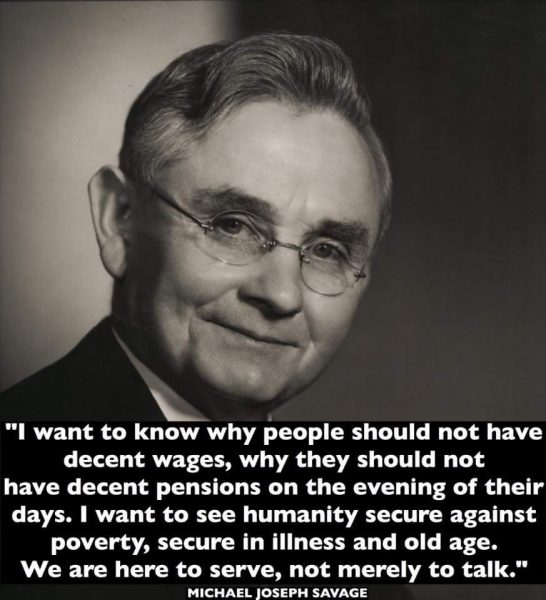
The shock resignation of John Key is still barely being comprehended. It’s a political earthquake, the size of the 7.8 one that just hit NZ, the enormity of just how much it changes the entire political landscape can not be underestimated.
Before those ramifications can be understood however, we must once again explore why NZers loved him and why the Left have been left weakened by not being able to beat him.
The mainstream corporate media are in a state of mourning, even elite lefties are bowing to Key. His leaving has set in motion grandiose legacy statements and attempts to tip ones hate at a departing leader.
Screw that.
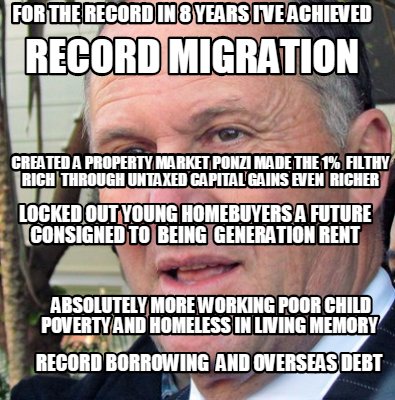
This vacant aspiration merchant, this bullying arsehole who saw only mirth in physically touching a young woman in her place of work, this war hawk, this dirty politics operator, this money man who borrowed billions for tax cuts while the poor struggled, this mass surveillance lying neoliberal sellout did one thing and one thing only in his entire 8 year role – what was best for John Key.
His venal selfishness is the most out standing part of his legacy. His ability to flood NZ with corrupt migration that created a property bubble benefitted Key’s popularity but robbed many forever of owning home. Key always did what was best for Key, not what was best for his Party, not what was best for Parliament and not what was best for NZ – Key looked after Key and it’s the enormousness of his selfishness in just walking off that has stunned so many who believed in him.
Even now, look at how Key has left at a time best for him. We must be the only country in the world who can have a PM announce their shock resignation and our media believe him with no further investigation. There is a deeply damaging rumour as to events that occurred in the middle of this year that has had a huge impact on Key’s decision to stand down, but no one is willing to even investigate that (we are doing our best).
The 300 000 kids living in poverty who had their chance for a free lunch and breakfast at school scuppered by John Key won’t thank him. The 41 ooo homeless won’t thank him, those punished by the neoliberal welfare state won’t thank him, the 10 000 prisoners beaten in private prisons won’t thank him, the generations locked out of homeownership won’t thank him.
So why was Key so popular? His migration scam pushed property prices beyond the reach of ordinary NZers, so those who owned property loved John Key and will probably write his name into the ballot sheet next year even though he’s not running. Traditionally the middle classes of NZ were where much of the social progress was amplified into political spheres, but by co-opting them all with an illusion of wealth via over inflated house prices, the middle classes ignored the plight of those who were being left behind and raced to support National.
That explains the educated middle class self interest, but what about the rest of the country, why did they love him? Because his laid back anti-intellectualism connected with our negative egalitarianism and made them feel at ease. None of this political correct stuff, none of this thinking ideas that make anyone uncomfortable, Key’s shrugging off of ideology relaxed Kiwis. He didn’t look down on their petty bigotry and small mindedness, he gave it a beer and a selfie.
His populism was Donald Trump without the spittle and wig.
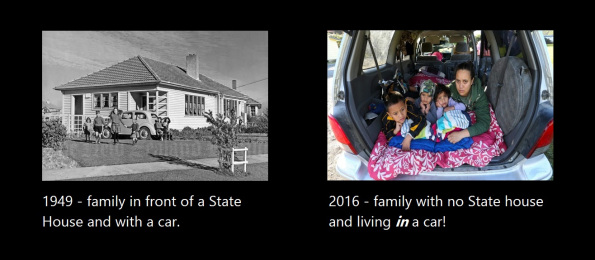
By not being able to beat Key at the ballot box, progressives are a weaker movement. Key’s abuse of political power should have been punished at the polls in 2014, it wasn’t. What does that say about us as a nation? The PMs Office plots with the Secret Intelligence Service to falsely smear Phil Goff months before the 2011 election and the public shrug. Private prisons that have soared to 10 000 prisoners doesn’t matter. 41 000 homeless isn’t too much of a bother and any hungry kids are the fault of the no-good bludger parents. What Key managed to get away with by simply keeping property investors rich means the Left failed to challenge his neoliberal state, his vast deep state powers or his crony capitalism.
Key was able to pass damaging policy that hurt the most vulnerable (whose political disengagement means that they don’t bother to vote) and the Left couldn’t put together a good enough argument to stop him.
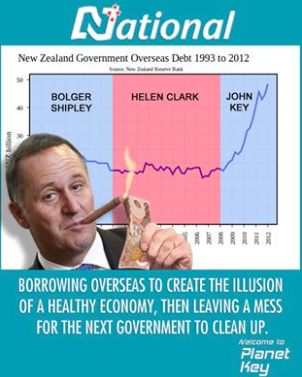
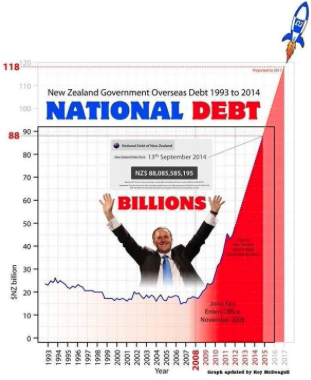
What says most about Key are his regrets. He says his biggest regrets were not getting his flag or signing us up to the TPPA. Those are his biggest regrets? What about the 300 000 kids in poverty? What about generations locked out of home ownership? What about 41 000 homeless? What about the huge debt he’s left the country in? What about 560 suicides per year? What about our social infrastructure that is falling to pieces? None of that was a regret for John, his regrets were his expensive vanity project and his chance to sign us forever under American corporate power.
Key’s laid back casual manner connected with little Nu Zilinds collective sense of anti-intellectualism in a quasi religious and spiritual way, that infatuation was never going to break without him leaving first.
In the end, it wasn’t him, it was us. It was our need to have a leader who didn’t really care about everyone, just those fortunate enough to have property.
To use a Keyism, at the end of the day it was all about John Key.
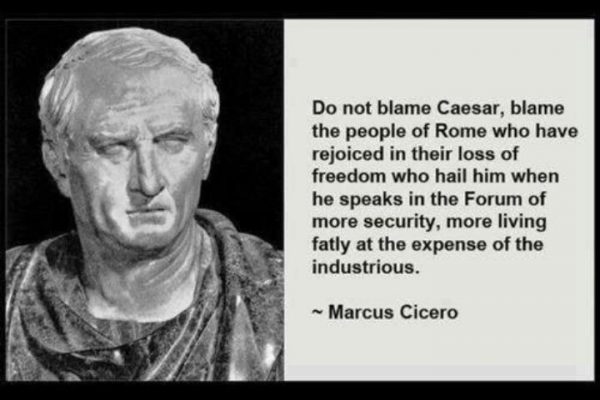
Key has unfinished business at Pike River – Stand with Pike
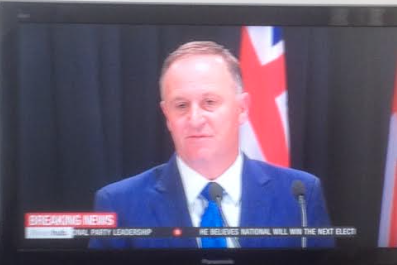
Pike River families are calling on John Key to stop the sealing of the Pike River mine before he steps down as Prime Minister.
Sonya Rockhouse, whose son Ben died in the disaster, says Key faces a choice about the legacy he leaves behind. “He can either do the right thing now before he goes, or forever be the Prime Minister who turned his back on our boys.
“We have expert advice that the drift can be re-entered to retrieve evidence of what actually happened down there, and our loved ones’ remains. All we want is the chance to do it, and he can give us that if he chooses.
“When he resigned today John Key talked about the Pike River disaster being one of the defining moments of his time as Prime Minister. He needs to make good on his promises or Pike River will define him as a failure.”
GUEST BLOG: Robin Aldridge-Sutton – Dont dismiss a possible Maori Party-Mana Movement alliance
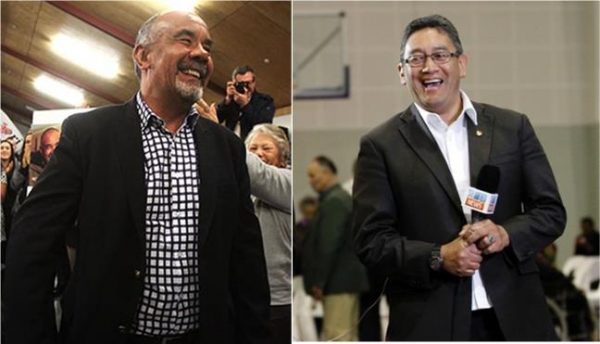
A lot of people shared this article on my facebook feed recently, Behold, Māori politics’ great realignment. Or, don’t believe the hype. Clickbait alert – Morgan Godfery suggests the latter option. But I didn’t really like it.
Morgan starts off listing all the naughty words Hone Harawira has ever said, which would certainly be serious offenses in any kindergarten. Harawira is obviously no saint, and his decision to go with Dotcom is still a mystery to me, but most of what he’s said is pretty reasonable in context. John Howard’s treatment of Aborigines was racist. Phil Goff helped rip off the foreshore and seabed. The tobacco lobby couldn’t be anything other than a bunch of pricks. White people have been stealing land from Maori and exploiting it for centuries. And John Key stopping Maori MPs attending a national Maori hui is patronizing and offensive.
The media love reporting on Harawira’s language because it’s easy to get an emotional reaction from readers without taking any risks, or doing any journalistic work getting into the important issues that he is one of the few politicians who has the guts to talk about. It’s a shame to see someone of Morgan’s status perpetuating it. In fact Morgan obviously doesn’t get it because he goes on to say it’s puzzling why Harawira is so popular among Maori, and puts it down to his being a hard-worker.
Morgan displays an impressive knowledge of the interesting history of Maori support for the Labour party, in order to claim that a possible Maori Party-Mana Movement alliance doesn’t matter. Most of that is irrelevant and smacks of that old irrational devotion so common in Labour party supporters who never acknowledged their party’s turning away from poor people in the 80s.
I guess another word for it is loyalty. Morgan is a member of no party but worked for Parekura Horomia and Rino Tirikatene, who both certainly would have inspired it.
What are relevant are the numbers who voted for the relevant candidates in the Maori electorates in 2014. I’ll put them at the bottom. Ikaroa-Rawhiti, Tamaki Makaurau, Te Tai Hauauru, Te Tai Tokerau, and Te Tai Tonga, would all be pretty close, but a Maori-Mana alliance would have turned over three of them on those numbers.
If Labour’s history with Maori didn’t win them more votes last election, why would it this time? Have they promised to give back the foreshore and seabed, or compensate for it? Have they unveiled any policies to get the atrocious numbers of Maori out of our prisons and into decent jobs? Have they promised to chase up the billions in tax being avoided by rich white people, and stop the war on disproportionately nonwhite beneficiaries? These are the arguments I’d love to hear Labour supporters like Morgan making, not the sadly faded history of a progressive Labour Party.
Obviously the numbers would and will be different. But it is clear to an unbiased observer that the possibility of an alliance does matter. In fact it has the potential to win 6 seats, which could make for a much more progressive government, as Martyn Bradbury recently pointed out. Labour would get the same number of MPs because of MMP, and NZ First could be excluded from government.
So Morgan’s probably right that some people are blowing this out of proportion, but there is still plenty of hype worth getting excited about.
2014 Maori Electorate Candidate Votes
Hauraki-Waikato
CULLEN, Susan MAOR 4,496
GREENSILL, Angeline Ngahina MANA 3,116
MAHUTA, Nanaia LAB 12,191
Ikaroa-Rāwhiti
FOX, Marama MAOR 3,848
NIKORA, Te Hāmua MANA 5,080
WHAITIRI, Meka LAB 9,753
Tāmaki Makaurau
HENARE, Peeni LAB 7,533
McLEAN, Rangi MAOR 6,071
PENE, Kereama MANA 2,624
Te Tai Hauāuru
McKENZIE, Chris MAOR 6,535
RURAWHE, Adrian LAB 8,089
WINIATA, Jordan MANA 1,940
Te Tai Tokerau
DAVIS, Kelvin LAB 9,712
HARAWIRA, Hone MANA 8,969
PAENGA, Te Hira MAOR 2,579
Te Tai Tonga
BEYER, Georgina MANA 1,996
BUTTON, Ngaire MAOR 4,891
TIRIKATENE, Rino LAB 8,445
Waiariki
FLAVELL, Te Ururoa James MAOR 9,726
SYKES, Annette MANA 5,482
WAITITI, Rawiri LAB 5,837
Robin Aldridge-Sutton recently returned to New Zealand to study data science after five years teaching English in South Korea.
Key’s departure raises many questions and gives no answers

Holy shit!
Of everything to say, that has to be said first. Not only is John Key’s resignation completely unexpected, it’s unprecedented and so far pretty much unexplainable.
It’s the biggest thing I can think of that has happened in Aotearoa politics without having an obvious cause (that we know about). No known significant tensions in the caucus. No real indication that his chances of getting a fourth term were any different than any other point this term. No scandals spinning out of control, no great perception of dire economic crises (despite their existence), no serious current threats for National’s polling. No nothing, really.
‘Resigning to spend more time with the family’ is a clichéd euphemism for ‘I was forced out’ or ‘I obviously couldn’t stay on’ in most situations. It’s a cop out, and it works because it symbolises that the departing knows they did wrong, they are accepting it, and from now they won’t be around to make any more mistakes so stop asking, thank you very much.
But that’s the entire explanation we have. He’s widely touted as the most popular PM ever, the National Party brand is almost exclusively built around him (“I’m a Key person” one election, “Team Key” the next), he is by most accounts the National Party’s best campaign asset by far, and he’s standing down because he’s had enough. Call it a good innings at eight years. The end of the day has finally come.
I basically just don’t believe it. And that doesn’t mean I back any particular speculation around as yet unknown reasons that might have led to the decision. It’s just, well, unbelievable.
The decision is so shocking that we have to ask some basic questions while unpacking John Key’s moves here. For starters, does he think his departure will be good for the National Party, or bad?
Bad, you would think, for the reasons stated above and across most of the comment so far. But it doesn’t sit right with me to think that John Key would intentionally harm the National Party because he was simply over it. Surely more time with Bronagh could wait maybe a year and a bit for the good of their party’s chances.
Maybe he thinks it will be good for National. Good in the long run, because refreshing the leadership at just the right time could mean their potential government next term is not as severely affected by the very rare disease of fourth-term-itis, with complications relating to a Winston Peters infection.
Or maybe he thinks his departure will be good for National before the election next year. It could be any of the number of theories about bombshells to come, his steadily decreasing popularity in the preferred PM polls, or the queues for selfies that he has reported are getting shorter each outing. But it seems so unlikely that whatever wind-down of his honeymoon period we might be finally beginning to see, his assessment would be that National would be stronger without the Key the public knows today than with him.
He’s endorsing Bill English for PM, so the move probably isn’t an act of falling on his sword early in the face of some serious government explaining to do on the near horizon. English is every bit as responsible for the state of the country as Key is.
So maybe as he says, he couldn’t bring himself to stare down the barrel of the camera and lie to us about being 100% committed to a fourth term. I find that pretty hard to believe when he’s happily lied to us plenty of times before, including arguably all year on this very issue.
Lots of maybes. One thing’s for sure – we can now stop saying “John Key will do anything to stay in power.” Turns out, he’s pretty relaxed about that, too.
What I really don’t understand is the mass congratulations he is given for going out on his own terms, quitting because he feels like it. This isn’t the same thing as Brendan McCullum and Ritchie McCaw quitting while world champions. Although I’m sure Key would love that comparison.
The move should be infuriating to the people that supported him, donated to him, volunteered for him, idolised him. Anyone who gives Key credit for anything they think is good about New Zealand should be very disappointed in him abandoning them.
The rich love what Key has done for them. He’s given them skyrocketing property values, a top bracket tax cut, new employment tools to exploit the working class with, and much more, doing it all with a goofy smile and maintaining the Middle New Zealand Vote. Their champion stood down, probably making it much easier for those parties that think inequality is actually a bad thing to take control. He did it to hang out with his wife. Why doesn’t she just come down to Wellington more, and take a few more holidays for a bit? The supporters should be livid.
Imagine Helen Clark standing down while Labour were doing well to spend more time with Peter. Different personal and political environments, but it’s the same job with the same duty and responsibilities. For Clark, such a move would have been the destruction of her reputation. Key is just so damn casual that he seems to be getting a free pass from his own supporters for deciding to head off a bit early to beat the traffic.
I hope his resignation as PM also voids his credentials as chief political and social commentator, All Blacks locker room creeper, pop music radio cringe inducer and the rest of it. Despite English sharing Key’s neoliberal agenda, at least he’s a bit more elegant about it.
Of course if 2016 has its way, we may well be living under the oppressive new regime of Prime Minister Crusher Collins next week. She hasn’t ruled out running at time of writing. If there’s anything that could make the rest of us miss Key, that would probably be it.
2016 ROGER AWARD FINALISTS NAMED – Worst Transnational Corporation Operating in Aotearoa/New Zealand

The six finalists for the 2016 Roger Award for the Worst Transnational Corporation Operating in Aotearoa/New Zealand are:
Bathurst Resources
Coca Cola
IAG/State Insurance
Uber
Westpac
Youi
There are two nominations for the Accomplice Award section – Talley’s, in partnership with Bathurst Resources; and the Government, specifically for its cheerleading role in championing the Trans Pacific Partnership Agreement (TPPA). There was also a clever nomination for the Government as corporation in its own right, which we will leave to the judges to rule on.
Bathurst Resources, in partnership with Talley’s, which is a contender for the Accomplice Award. Both these companies are first time Roger Award entrants but highly deserving ones. The Bathurst nominator summarised it thus: “for expanding (in association with Talley’s NZ Ltd) coal mining in NZ in defiance of NZ’s commitment to the Paris Climate Change Accord”. And detailed how the nomination met the criteria:
“Impact On People: In expanding coal mining on the West Coast by taking over Solid Energy’s Stockton mine (and two more in Waikato), as well as the planned Denniston mine, Bathurst claims to be acting in the best interests of West Coasters, whereas in effect they are taking Coasters down the eventual dead end development of a polluting industry. It’s also hardly people-centred to be in partnership with Talley’s, reportedly NZ’s worst employer”.
“Impact On the Environment: As Coal Action Network & Forest & Bird have pointed out, Bathurst is already putting fragile and unique ecosystems at risk through planned open cast escarpment mining on the Denniston Plateau. In addition to adding to environmental pollution by taking over Solid Energy’s Stockton mine, Bathurst plans to apply to mine in an adjacent conservation estate and has been assured by the Crown that ‘Environmental Indemnity Funding’ is available to Bathurst as it was to Solid Energy to enable local authorities to ‘cap any environmental claims at the indemnity level’ (Press, 1/11/16)”.
“Political Interference/Influence: The above reference to ‘Environmental Indemnity Funding’ indicates that intense pressure was brought on the Crown to extend the most favourable terms possible when negotiating the sale of the insolvent Solid Energy mines to Bathurst. The Government was prepared to do this despite widespread concern that it was abrogating its’ commitment to the Paris Climate Change Accord. The partnership with Talley’s will require Overseas Investment Office approval as Bathurst is a Singaporean and Australian-owned company, but such an approval is a foregone conclusion”.
“Economic Dominance: ‘We will not be compromised, nor will we be hidden’ boasted Bathurst Chief Executive Officer, Hamish Bohannan, back in March 2012 at the opening of its’ new corporate offices in Wellington, an event attended also by PM John Key and other MPs. Now with the acquisition of Solid Energy’s Stockton mine, Bathurst will surely become the economic Caesar of the West Coast, subordinating all to their whims and manipulations and in particular taking Westport down a one-way no-exit street of economic non-sustainability and eventual demise. Changing the listing of the company’s shares from the NZ to Australian Stock Exchange also enables Bathurst to be a little more non-transparent to NZ investors and commentators”.
Talley’s. The nominator wrote: “The technical justification for an award to a New Zealand company not itself directly controlled (in terms of the legal definition) by an overseas corporation or government is that it assists such an overseas organisation in penetrating the New Zealand economy and/or polity. Such accomplices are classic examples of comprador capitalism Thus; Talley’s joint venture with the notorious Bathurst mining company… must surely make it a suitable candidate for the Accomplice Award”..
“Increasingly, successful ‘New Zealand’ enterprises seek themselves to behave vis-à-vis other countries exactly like foreign enterprises investing here. If we oppose foreign investment here, how can local investment in other countries be acceptable? In essence, it is capitalist globalisation that needs to be opposed, and attacking its most prominent attribute – foreign control – and its local confederates and accessories is a useful tactic. But no more than that. And it does not absolve us of the responsibility to attack local capitalism equally. Because there is little that is noble or democratic or environmentally preferable or with better labour relations about local capital either. Talley’s is a supreme example of that”. The evidence accompanying Talley’s nomination detailed its appalling record towards its workers, unions, climate change and a whole range of subjects.
Coca Cola had also been a finalist in 2014. This time the nomination was entitled “Taste The Feeling & Take The Money”, and was for Coke’s impact on people “and perhaps economic dominance”. Some extracts: “By persistently peddling high sugar drinks that can be addictive, Coca Cola Amatil is undermining the health of many New Zealanders and contributing to increased costs to the health budget. Money buys good marketing and Coca Cola has once again led the way in a clever combination of funding community events and deals with sports celebrities”.
“Most of its 25 products cause physical harm to people’s health when regularly consumed. The company is actively contributing to rising levels of ill health and the need for increased funding for the treatment of disease like diabetes. To a lesser degree it fits the economic dominance category – along with Frucor (owned by Suntory Group, a leading Japanese food and beverage company) it dominates the NZ beverage market”.
“Coca-Cola may have funded Christmas in the Park, paid for Mahé Drysdale’s gold medal rowing efforts as a Powerade ambassador at the (Rio Olympic) Games and basketballer Steven Adams as another promoter of Powerade, but it does not take away from the facts that it is peddling sugar and ill-health. Earlier this year in a submission on an Advertising Standards Authority review, the Nelson Malborough District Health Board called for an end to sponsorship deals between sports teams and junk food giants”.
“Dr Rob Beaglehole said they were the number one source of sugar in the diets of New Zealand children, contributing to the incidence of tooth decay, obesity and type 2 diabetes as well as other health problems. ‘It make sense for me to turn the sugar tap off in order to save these kids’ teeth’, he said. Beaglehole used anecdotal stories that showed the cultural sway of sports heroes like former All Black captain Richie McCaw who drank Powerade”.
“The nomination seeks to highlight the harmful effect of sugar-sweetened beverages and the increased incidence of obesity related diseases such as diabetes and serious tooth decay including amongst Maori and Pasifika peoples. Seven per cent of New Zealanders have diabetes and one in five adults are at risk of getting it. 10% of Maori and 15% of Pacific people have diabetes. Many people do not realise the potential harm from Coke. One man reported his heart scare to a reporter. Beverage manufacturers have collaborated with supermarkets and others to make these drinks cheap and easily accessible. Something that was once a ‘treat food’ is now a drink that significant numbers of people drink in comparatively large quantities every day”.
“Who is to blame for the overconsumption of unhealthy beverages? An emphasis on individual choice, the use of celebrity sports people as sponsors, a highly successful global brand and lack of Government policy have enabled Coca Cola to increase market share and corresponding profits. The costs of overconsumption are borne by the public. Effectively Coca Cola and other sugar-sweetened beverage manufacturers have increased consumption of cheaper unhealthy products to a level that has raised growing medical concern”.
“When a brand is as strong as Coca Cola, those who are associated with it have immediate recognition. At the global level it has destroyed local drink manufacturers, used up valuable water supplies and created a homogenised culture in most countries. You can taste the feeling – a successful transnational corporation purveying harmful sugar and caffeine but hiding its costs and the damage such activity does”.
IAG/State Insurance is the defending champion, having won the 2015 Roger Award and is a finalist for the fifth consecutive year, which will be no surprise to anyone who has lived in Christchurch since 2010. It was nominated this time for impact on people. “Six years after the Christchurch earthquakes started the insurance transnationals (of which IAG/State is by far the biggest) are still making life hell for a significant number of Christchurch people. IAG/State is far from alone in this but it is the biggest and some of its practices are the worst”.
“In 2016 State has been repeatedly hammered in the Christchurch media for its sheer pigheadedness in one particularly egregious case – that of Sumner’s Cave Rock Apartments. One Press headline (13/8/16) says it all: ‘Elderly Die In Wait For Settlement’. This is a transnational corporation which is literally solving the problem of having to meet its contractual obligations by delaying things until its customers all die. And insulting them in the process – see the Press article (17/8/16) headed: ‘Claimants “Stingy” – IAG Employee’”.
“The evidence is not all about one block of flats (although it is all about Christchurch). There is the case of the couple who took State to court and won amore than $700,000 for the rebuild of their home. There are the people still waiting for their homes to be repaired (‘They treated us like a couple of old fools’ – Press, 21/3/16, ‘Long, Lonely Wait For Quake Repairs Fix’), problems with the quality of work performed by the tradesmen contracted by IAG/State to do the repairs, etc, etc”.
“But this is not a matter of flogging a dead horse. Unfortunately this horse is very much alive and still in need of a damned good flogging. As has been said before in previous Roger Awards, what has happened, and is continuing to happen in Christchurch, sets a very bad precedent for what the rest of the country can expect from IAG/State and the other insurance TNCs in the event of a major disaster. The people of Kaikoura and Wellington need to be very afraid of what the future holds for them (and the huge number of Aucklanders who live in apartment blocks and other multi title units should hope that no natural disaster occurs in their city). The Christchurch experience continues to show that the “cure” of insurance is quite often worse than the sickness of earthquakes”.
Uber is another first time Roger Award entrant but a very worthy one, because it is touted as a prime example of the “new economy”, the “sharing economy” and, to use the cliche du jour, the “disruptive” economy. Actually it’s just the same old capitalist bullshit, only even more efficient in its ruthlessness. The nominator wrote: “Uber Technologies Inc, an American international technology company. Uber BV is owned by the Dutch company, Rasier Pacific VOF. They are the subject of ongoing protests and legal action from taxi drivers, taxi companies, and governments around the world”.
“Uber ‘arrived’ in New Zealand in 2015, planning to bust open New Zealand taxi services and passenger carrier laws. Called share-riding, trips can be booked through an app, on digital devices. Uber is paid directly and ‘pays’ its’ drivers weekly, minus commission, yet drivers are not employees, but self employed (so are required to pay their own taxes, GST, etc) Uber control the pricing and often have 20% reductions without informing drivers. Many drivers have reported making $* per hour after their costs”.
“Since its arrival Uber has made regular appearances in our media, mostly negative. Uber encourages its drivers not to follow the laws other passenger carriers abide by, such as not having a “P” endorsement. Not having commercial insurance; in fact, Uber drivers are told they only need third party insurance. Not correctly vetted. Vehicles are not visually checked to see if they are registered and warranted“. The accompanying evidence was a whole lot of 2016 media articles about Uber thumbing its nose at NZ’s passenger transport laws, ripping of its drivers, being the subject of taxi driver’s protest actions, and dodging taxes. For the details on how Uber dodges taxes, both in NZ and everywhere else, see Deborah Russell’s article elsewhere in this issue (“Tax Avoidance Is A Moral Issue”, specifically the sub-section “Finding Ways Around Tax Laws”).
Westpac is a recidivist Roger Award offender, having been a finalist several times (most recently in 2015), one of three equal runners up in 2011, and the joint winner in 2005 (with BNZ). In 2016 the nominator wrote: “Westpac has withdrawn services in 17* areas imposing loss of jobs on staff. Politically negative and economically threatening” (*it is actually shutting 19 branches). Westpac wasn’t the only Australian bank shutting rural branches in 2016 but it was doing it the most and was the most high profile offender. In the case of several of those South Island small towns, the people weren’t prepared to take it lying down e.g. there were very well attended public meetings and pickets in Fairlie and Ranfurly.
Central Otago’s Mayor, Tony Lepper, summed it up succinctly: “The Council will join the list of people who are disappointed that Westpac, who are making millions of dollars out of rural New Zealand, are abandoning a town 90 km from the nearest bank. We are happy to talk with then about alternatives but the best solution is a branch in Ranfurly” (Press, 23/8/16, “Maniototo Community Rallies To Fight To Retain Town’s Only Bank”, Jo McKenzie-McLean, http://www.stuff.co.nz/the-press/news/83115518/maniototo-community-rallies-to-fight-to-retain-towns-only-bank). Fairlie also stands to lose its only bank (not just its only Westpac branch). This demonstrates the contempt that Westpac displays towards its small town and rural customers, particularly the elderly ones.
Youi is a newie also but a richly deserving Roger Award finalist. The nominator wrote: “I nominate Youi for the 2016 Roger Award, for impact on people. Also for profiteering. And for straight out criminality (namely fraud and theft). It is a novelty for a Roger Award nomination of an insurance transnational (Youi is South African-owned) not to include the words ‘Christchurch’ or ‘earthquakes’. This has got nothing to do with either. There is nothing hard to understand as to why Youi is a richly deserving contender. On the contrary, it is very easy for ordinary people to understand what Youi did wrong. It is purely and simply the systematic defrauding of, and theft from, the public”.
“It’s all in the accompanying evidence. But it can be very easily explained here. Youi, uniquely, does not do business online. Very deliberately, they insist on everything being done over the phone. Once engaged in conversation, their call centre staff insist on being given the caller’s credit card details on purely spurious grounds. Once the company has those details, it starts taking money off the card or out of the caller’s bank account. Despite the caller not being a Youi customer or having taken out a Youi policy (this is the most egregious aspect of this corporate crime). The caller may simply have rung up for a quote for car insurance, decided not to join Youi and stuck with his or her existing insurance company.. But Youi, having got his or her credit card details, proceeds to start taking money out”.
“This scandal has not gone unnoticed or unpunished. Youi has pleaded guilty to 15 representative charges filed by the Commerce Commission (at the time of writing, the penalty has not been announced). Plus it has been fined $100,000 (the maximum possible) by the Insurance Council of NZ, of which it is a member (and has been allowed to remain so). I have included evidence that is from overseas (Australia) and outside the 2016 Roger Award time period (an NZ Herald article from March 2015)”.
“Both provide vital context – the Herald article (‘Insurance Company’s Sales Tactics Shocking, 15/3/15, Diana Clement) alerted the world to what Youi was up to (they took $590 off her Visa card without her permission). The extremely detailed Sydney Morning Herald article (‘Does Youi Owe You? Insurer Accused Of Billing Without Consent’, 28/8/16) cites that 2015 NZ Herald article and makes very clear that Youi operates this scam on a trans-Tasman basis. ‘In fact, the staff defrauding customers across the Tasman were trained in the tactics by Youi’s staff in Australia. The whistleblowers also claim Australia’s call centre actually made many of the illegal phone sales made in NZ’”.
“The reason for this systematic fraud is simple – Youi’s call centre staff are relentlessly pressured by management to make sales. The company practises every underhand trick in the book to extract the maximum amount of money from people, including those who actually are its customers. ‘But that quote is often more expensive than a competitor’s. So sales staff, the whistleblowers say, use every tactic they can to lower the premium and get the sale – including falsifying the policy. The most common trick is car colour. Youi charges more to insure red or black cars; because they are statistically more likely to be in an accident. To lower the premium, sales staff just put the colour in incorrectly’ (Sydney Morning Herald, op cit)”.
“This systematic criminal behaviour is becoming the “new normal” for Big Business globally (i.e. in the First World, not just in the Third World). Currently there is a huge scandal in the US involving Wells Fargo Bank having set up two million fake bank accounts and credit cards and then having charged the unsuspecting holders of these more than $US2 million in fees. The cause was the same as with Youi – relentless top down pressure on staff to make sales”.
“Wells Fargo has incurred $US185 million in civil penalties and its CEO resigned in October 2016. Rana Foroohar wrote in Time (12/10/16, ‘Why The Wells Fargo Scandal Really Matters [Hint: It’s Not Just the Fraud]’, http://time.com/4529054/stumpf-wells-fargo-fraud/?iid=sr-link1): ‘Let me be clear: I didn’t think he’d resign because the behaviour under his watch was egregious – that hasn’t stopped any number of other financial executives from staying in their posts’”.
“’But rather, I thought he would fall because the fraud in this case was just so easy for average people to understand. Spliced and diced derivatives contracts sold across borders to gullible counterparties? Huh? But straight up fraud – taking customers’ personal information and using it without their knowledge or consent – that’s something everybody can understand. And be justifiably outraged by’. So, what Youi did is not a one off, or ‘one bad apple’. It’s the new way of doing business. But it’s got a very old name – crime. And even worse for the spin doctors and bullshit artists of capitalism, a type of crime that ‘everybody can understand. And be justifiably outraged by’”.
The Government For The Accomplice Award. The nominator wrote: “Very specifically, it is for the Government’s role in championing the Trans Pacific Partnership Agreement (TPPA) to a much more extreme degree than any of the other 11 countries that signed up to it. The NZ government was the TPPA’s chief cheerleader for several years. This reached its natural conclusion in February 2016, when Key hosted the formal signing, in Sky City in Auckland. What more appropriate venue!”
“It goes without saying that the TPPA represented a charter for transnational corporate control over a significant percentage of the world’s people. And then, as it became overwhelmingly clear that the TPPA was doomed, that it would never be ratified because both US Presidential election candidates opposed it, the Government blindly pressed on with passing the necessary legislation to implement it in NZ. Even after Trump was elected and pronounced the TPPA dead as far as the US is concerned, the Government pressed on with its meaningless TPPA legislation (which wouldn’t come into law until the TPPA itself had been internationally ratified)”.
“’But Trade Minister Todd McClay said passing the legislation, which would allow the country to join the TPP, would be a sign to the world that New Zealand was a champion of trade liberalisation’ Radio NZ, 11/11/16,“Trade Minister ‘patron saint of lost causes’ on TPP” http://www.radionz.co.nz/news/political/317837/trade-minister-‘patron-saint-of-lost-causes’-on-tpp. That says it all really, doesn’t it? Plucky little New Zealand leading the world on the crusade to the promised land of Freetradia.
“Volunteering to jump off the cliff first while the rest of its ‘mates’ cheerfully look on. ‘We’ll jump first to set an example to the rest of you’. If there was a Roger Award category for political delusions, the Government would win it hands down. ‘The TPPA’s not dead – it’s just having a lie down. We’re right and everyone else is wrong. They’ll come to their senses soon enough’. Hoist with their own petard. Couldn’t have happened to a nicer outfit”.
“Family package” something to look forward to? Child Poverty Action Group

Child Poverty Action Group (CPAG) says the latest comments from Prime Minister John Key around shaping budget surpluses into better support for families is heartening.
“We are keen to see what the promised ‘tax and family package’ is, and to assess how that will help the worst-off families,” says Associate Professor Susan St John, CPAG spokesperson for economics and welfare.
Minister of Finance Bill English has recently agreed that Working for Families (WFF) is a good way for funds to reach “the families with children and families that are on low incomes”.
CPAG urges the Government to reverse the ways the current WFF drives inequality and discriminates against the children of families who do not meet the rigid hours of work criteria. In particular the significant In-Work Tax Credit worth at least $72.50 is denied to the very worst-off families.
Since April 2016 CPAG has been campaigning to remove the restrictive criteria on the In-Work Tax Credit and make it universally available to all low-income families.
CPAG says that the best thing to do to reach families in New Zealand would be to remove the off-benefit rule and work hours criteria from the In-Work Tax Credit. An extra $72.50 added to the first child Family Tax Credit would enable more families to afford the basics for their children and reduce the demands at food banks this Christmas.
The Child Poverty Monitor reports that 47% of children living in poverty have at least one working adult in the family. Part Two of the CPAG’s Fix Working for Families (FWFF) campaign highlights the way WFF is being eroded for low-income working families. These families are affected by a failure to index rates annually, and by policy that reduces the threshold and increases the rate of abatement for WFF over time.
If WFF had been properly adjusted based on inflation since its inception, the income threshold for the maximum payment would look more like $44,000. Instead it is only $36,350 and is set to fall to $35,000. WFF spending has been reducing in real terms over time, when it should be increasing, not just for inflation, but also to reflect growth in wages – just like New Zealand Superannuation.
Supporting families with adequate incomes is the fence at the top of the cliff. Government can reap the cost savings that will come later. The #FWFF Part Two Summary is available here.
Medical students and senior doctors call for greater investment in medical workforce – ASMS

The organisations representing both medical students and senior hospital doctors are calling for a greater focus on building a sustainable future medical workforce.
The New Zealand Medical Students’ Association (NZMSA) and the Association of Salaried Medical Specialists (ASMS) have put out a joint statement urging more investment in the current and future medical workforce to ensure top quality public health care.
NZMSA Immediate Past President Mike Fleete says the statement was developed after a joint conference of medical students and senior hospital specialists earlier this year.
“We wanted to send a clear, united message to the leaders and decision-makers in the health sector that the medical workforce needs to be adequately resourced and invested in if New Zealanders are to continue having high quality health care,” he says.
“As the next generation of doctors, we want to make sure the medical workforce and our public hospitals are in good shape by the time we’re ready to work in them. We’re training to be doctors because we believe in providing the best patient care and making a real difference in people’s lives.”
ASMS Executive Director Ian Powell says it was the first time the two organisations had come together in a formal way to discuss challenges facing the medical workforce and public health care, and he urged the Government to engage with doctors on issues of resourcing and investment.
“We’re very fortunate in New Zealand to have an experienced, well-trained and dedicated health workforce but increasingly our doctors and other health professionals are being asked to do more with less. This is simply unsustainable, and we’re already seeing the effects in the high levels of presenteeism and burnout being reported by senior doctors and dentists working in our public hospitals.”
Ian Powell and Mike Fleete say their two organisations have been developing a closer working relationship since 2014, and plan to continue working on issues of shared concern.
A copy of the joint communique is available online here .
E tū welcomes Bill English’s call for investment in human capital

E tū, the country’s largest private sector union, welcomes today’s comments from Deputy Prime Minister Bill English in his opening address at the Government Economics Network annual conference.
E tū National Director of Campaigning, Annie Newman says that it is positive that Mr English recognises that NZ needs to invest in human capital.
“E tū members would agree that there needs to be better investment by New Zealand employers in their staff who after all create the wealth. Where we would disagree with Mr English is that the government’s role stops at the provision of compulsory education,” says Annie.
“There is a large body of evidence including from work done by people like Charles Waldegrave at the Family Centre, as well as large employers overseas; which shows the impact of paying a decent living wage on productivity”.
“What E tū would like to see is the government setting an example by committing to a living wage for their own directly employed, and contracted workers,” says Annie.
“It is not just our members saying it, but a growing number of employers; that a living wage can increase productivity and reduce over-all costs through improved retention and staff health and wellbeing. It can also in the long-term feed into better education and health outcomes for the children of affected staff.”
GUEST BLOG: Dave Brownz – #FJK Agent of Finance Capital

Prime Minister John Key’s sudden resignation has created a flurry on the surface of NZ politics. Left, Right and Centre are writing political obituaries about his “legacy”. Legacies refer to what politicians have done to establish their reputations in history. But what are the hidden assumptions behind the evaluations of political reputations? Unless these assumptions are tested and critiqued, John Key’s actual historic role as an agent of the international finance capital cannot be understood.
As usual the Left is wallowing in superficial chatter. Key’s reputation is as a smooth operator who kept a fragile coalition majority lined up over a 3-term government. Therefore, his departure becomes an opportunity for the opposition to improve their chances of winning in 2017. Little has to “step-up” and Labour-Greens plus a rejigged Mana/MP combo, and even a ‘populist’ NZ First, could combine to form the next coalition government.
Much of the Left’s animus is directed at Key as if he was personally responsible for the failure of the left to win support and remove National from power. This means the left failed because they could not put up a leader who could compete with Key’s popularity. So the Left sees their failure as the direct consequence of Key’s success in winning the “middle ground”. Yet Key’s success can only be explained by the way he represented the interests of his class, not his personal attributes in attracting voters. And that can only be explained by first acknowledging what those class interests are.
Of course, this is equally true of the Left’s representation of class interests. And we have always argued that the true difference between Key and his various Labour, Green and NZ First leadership rivals, is that Key understands and knows how to serve his capitalist class masters, while the Left continues to subordinate the interests of working class to those of the capitalist ruling class by appealing to a classless “middle NZ” or the “middle class”. We will develop this point in the section ‘Left Opposition in Capitalist Politics’ below.
Economics determines politics
As we have argued in before, bourgeois democracy is a false representation of reality. It presents capitalism as based on the equal opportunity of sovereign individuals who delegate their sovereignty to their political representatives in parliaments or congresses where they legislate to manage the economy in the supposed ‘national’ interest. Thus, the exploitative capital relation based on a fundamental class inequality in the ownership of property, and the conflict and crises that result, are obscured by the fetish of ‘representative democracy’ based on the will of sovereign and equal individuals.
Politics therefore is an extension of economics, where parliament is no more than a “committee to manage the affairs” of the ruling capitalist class. The best capitalist politicians are ‘selected’ (trained, co-opted) to manage those ruling class interests. They do this in two ways. The first is the use state power to advance, protect and subsidise private property and the production of profits. Second, is the role of political leaders to manage the destructive social consequences of capitalist economic policies upon the working class, broadly defined.
In simple terms the success of Key in managing capitalism then comes down to his performance in advancing the conditions for economic growth on the basis of profitability, and presenting the growing social inequality arising from this as no more than the failure of individuals to make the best of their opportunities in the market. The radical critique of “crony” capitalism does not penetrate this veil either because it implies a “non-crony” or egalitarian capitalism as the Left alternative to the ‘capture’ of capitalism by “cronies”.
To assess Key’s performance in serving not just his “cronies” but internationalist finance capital, we have to understand both the place of the NZ economy in the world capitalist economy and the state of the world economy as a whole. These structural conditions determine the tasks of managing NZ capitalism, and Key’s success or failure, as with all politicians, as a political manager. For an analysis of why Trump cannot overcome the Terminal crisis of capitalism or suppress the social conflict it creates without turning himself into a Louis Bonaparte-type dictator, see “Trumped, Stumped and Dumped”.
NZ: Neo-colony in global Terminal Crisis
The difference between the US and NZ is that the former is an imperialist state while NZ is a semi-colony of the US and, in the 21st century, of China. China, along with Russia, is now part of an emerging imperialist bloc in competition with the US-led bloc. In relation to the US and China, NZ has an economy that is integrated into the global economy as a producer of mainly primary produce and tertiary services wide open to foreign investment, ownership and control. Trump’s task to overcome the decline in US imperialism means making weaker imperialist powers such as China, and the neo-colonial countries like NZ, pay for the crisis. This is turn determines the task of neo-colonial or “comprador” capitalists like Key to act as the agents one or other imperialist countries.
When most of the NZ Left shares the superficial view that NZ is a minor imperialist power, why do we insist that NZ is a neo- or semi-colony? We can only summarise NZ’s capitalist evolution here. For a fuller Marxist account see The Evolution of Capitalism in NZ. NZ from the time of its settler colonisation has always been some form of colony dominated by imperialism. The extraction of surplus from agriculture etc. and the export of raw materials, consigned the colony to underdevelopment, rising inequality, and finally a shift from protectionism to the neoliberal counter-revolution from the mid-1980s until today. Rogernomics called for a new comprador class that rejected economic nationalism as no longer in the interests of international finance capital. From that point on, NZ deregulated its protected market to open it to the global capitalist economy.
A new set of politicians committed to neo-liberalism, or its Left “third way” variant were now thrust forward to manage the deregulated economy. John Key inherited the neo-liberal legacy of managing a neo-colony a full 20 years after the neo-liberal turn in 1984. He was uniquely suited to that task as no other National Party leader had his background in international finance. This is why some of the conspiratorial Left have seen him as an agent of Wall St, and this may well be behind Winston Peters’ response to Key’s resignation that he jumped ship before the ship hit the fan. Key represents international capital and knows that NZ is not a healthy, Rockstar, capitalist economy facing a global economy about to crash. NZ is a fragile, dependent economy for which Terminal Crisis will pose a new set of tasks, complementary to those of Trump, of making NZ neo-colonial workers and working farmers pay for the crisis with their livelihoods and lives. Key’s resignation is a statement that he doesn’t want to lead that fight.
Left Opposition in Capitalist Politics
Instead of basing its strategy on the demise of Key freeing up the “middle ground”, the Left Opposition should rethink its bourgeois assumptions about politics. If Key is an agent of international finance capital, and performed well in advancing its interests, then the Left Opposition policy should counter-pose the interests of those who work for a living and produce a program that fights finance capital. We don’t mean by ‘finance capital’ Wall St speculators, but the Marxist definition of the fusion of banking and productive capital. Instead of playing its classic role of boosting illusions in a reformed capitalism, the Left should understand that the coming economic crash fused together with abrupt climate change has exhausted the potential for capitalist reforms. In the face of Terminal Crisis, we need a Left Opposition that turns to socialism to solve the crisis.
The Left has to give up on the failed utopia of Social Democracy, and more critically, bourgeois democracy serving all citizens and nations equally. The history of bourgeois democracy is that it acts to defend capital and prevent the independent mobilisation of the working class internationally. Worse, it softens workers up for fascism and imperialist war. The delusion that class can be legislated out of existence has to be exploded. The Left has to overcome its failed legacy of reforms now destroyed by the neo-liberal counter-revolution, and go forward towards the working-class majority building its own organisations outside parliament, and increasingly committed to overthrowing the capitalist state and the ruling class it represents. This is what we mean by Survival Socialism!
For a Workers’ Government, capable of expropriating capital and building a socialist economy and society as part of a Pacific Federation of Socialist Republics!
Dave Brownz is TDBs guest Marxist blogger

